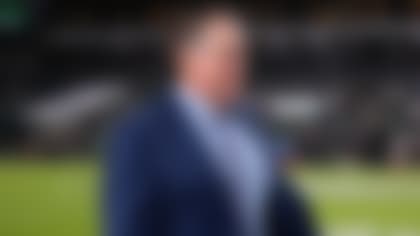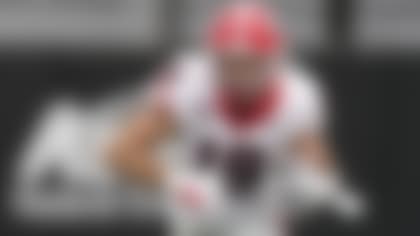Miami will lose nine scholarships over the next three years but not receive a postseason ban, the NCAA announced Tuesday after an investigation into the school's athletic program that lasted more than three years.
Miami self-imposed a postseason ban in each of the past two seasons, which mitigated some of the potential damage: The NCAA's report on the investigation said the infractions committee "acknowledges and accepts the extensive and significant self-imposed penalties by the institution." Last season's ban kept Miami, which finished 7-5, out of the ACC championship game.
In addition, during the 2014-15 and 2015-16 academic years, Miami will be limited when providing complimentary admissions to prospects on unofficial visits.
Things we learned

From Jadeveon Clowney returning to form to Florida State's complete dismantling of Clemson, here are the 38 lessons learned from the college football weekend. **More ...**
Because the NCAA said they lied to investigators, former Miami assistants Clint Hurtt, now the defensive line coach and recruiting coordinator at Louisville, and Aubrey Hill, currently the coach at Miami's Carol City High, were given two-year show-cause orders. Hill was wide receiver coach at Florida in 2011 but resigned a few days before the start of the 2012 season after reports surfaced about Hill's role in the problems at Miami.
In addition, Missouri basketball coach Frank Haith -- who had held the same position at Miami before being hired at Mizzou before the 2011-12 season -- will be suspended for the first five games of the season for transgressions he committed at Miami. Former UM basketball assistant Jorge Fernandez also was given a two-year show-cause order; he was an assistant at Marshall before resigning in May 2012. Miami also was docked one basketball scholarship in each of the next three seasons.
The NCAA report says the case "started as a self-report by the institution" in November 2009, dealing with phone and text messages rules violations. The focus changed in February 2011, the NCAA report says, when "the booster" -- convicted Ponzi schemer Nevin Shapiro -- sent a letter to the NCAA detailing numerous rules violations.
The NCAA report said the case "involved numerous, serious violations of NCAA bylaws, many of which were not disputed." The report also said, "It is clear that the institution substantially agreed with a majority of the violations."
In one of the many footnotes in the 102-page report, the NCAA said, "The committee takes notice that the booster is a convicted felon who is in prison as a result of pleading guilty to a crime that involved deceiving people. The committee made its factual findings based on information that was corroborated by photographs and statements of others, including then student-athletes and prospects (against their own interests) and their high school and nonscholastic coaches."
The report says Shapiro entertained players at his house, on his yacht, at bowling alleys, at restaurants, at nightclubs and at strip clubs. "These activities occurred regularly from 2002 through 2009," the report said. Shaprio also gave several players gifts of cash, clothing and other goods, including a TV. In some instances, the report said, the players asked for the gifts, but in other instances, they were proffered by Shapiro with no request from the player.
The report also said Shapiro was an investor in a sports agency headquartered in Jacksonville, and was involved in identifying and recruiting potential clients. Shapiro, the report said, provided cash signing bonuses to players who agreed to be represented by the sports agency.
So a three-year-plus investigation that uncovers all that rules-breaking results in just nine lost scholarships over three years and a two-year postseason ban that was self-imposed? Well, the NCAA report also talked of "procedural irregularities" by the enforcement staff in conducting the investigation. Earlier this year, NCAA president Mark Emmert called the investigative mistakes an "embarrassment," and the NCAA fired its vice president of enforcement.
The "procedural irregularities" are why Miami got off relatively scot-free. A pattern of rules-breaking over seven years should lead to a loss of more than nine scholarships in three years. And self-imposing bowl bans was a smart move by school officials, as well. It provides a blueprint for schools to follow in the future.
Consider Ohio State, for example. The school pondered a self-imposed bowl ban for the 2011 season after the Jim Tressel saga. Instead, it decided to play in a bowl after a 6-6 season. The NCAA then imposed a one-season postseason ban, and that kept a 12-0 Ohio State team from playing in the postseason in 2012. Had school officials self-imposed, last season's team might have played for the national title.
The scholarship limitations won't be that big a deal for Miami. The school has just 74 players on scholarship this season -- 11 below the NCAA limit. Miami may not have elite depth across the board, especially in the defensive back seven, but the Hurricanes are 6-0 and ranked seventh in this week's BCS standings. Smart personnel management is something coach Al Golden and his staff have shown they can handle, so the minor scholarship restrictions aren't going to matter.
Yes, Miami has been under a cloud because of the length (and bungling) of the NCAA investigation. That cloud is gone now. The immediate future looks quite good, which almost never is the case when a school gets penalized by the NCAA.
Indeed, in a weird way, it's as if Miami is getting off probation rather than going on probation.
Mike Huguenin can be reached at mike.huguenin@nfl.com. You also can follow him on Twitter @MikeHuguenin.











